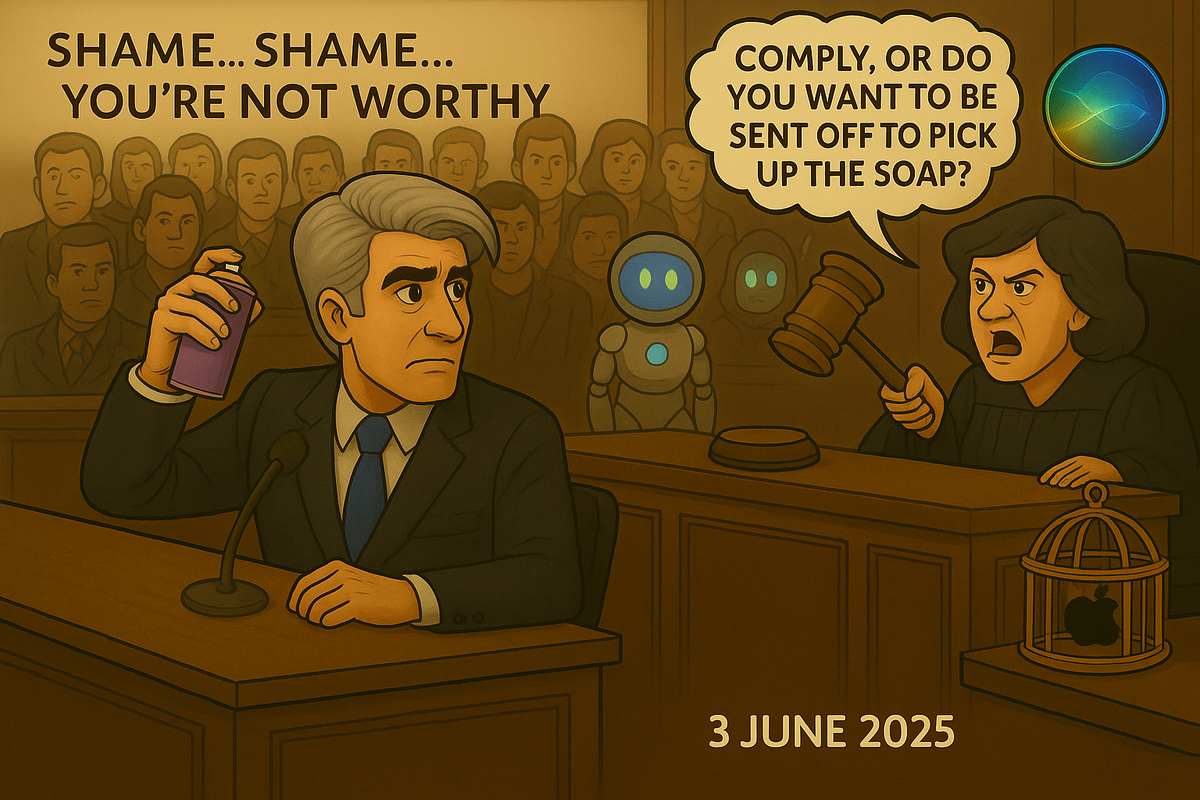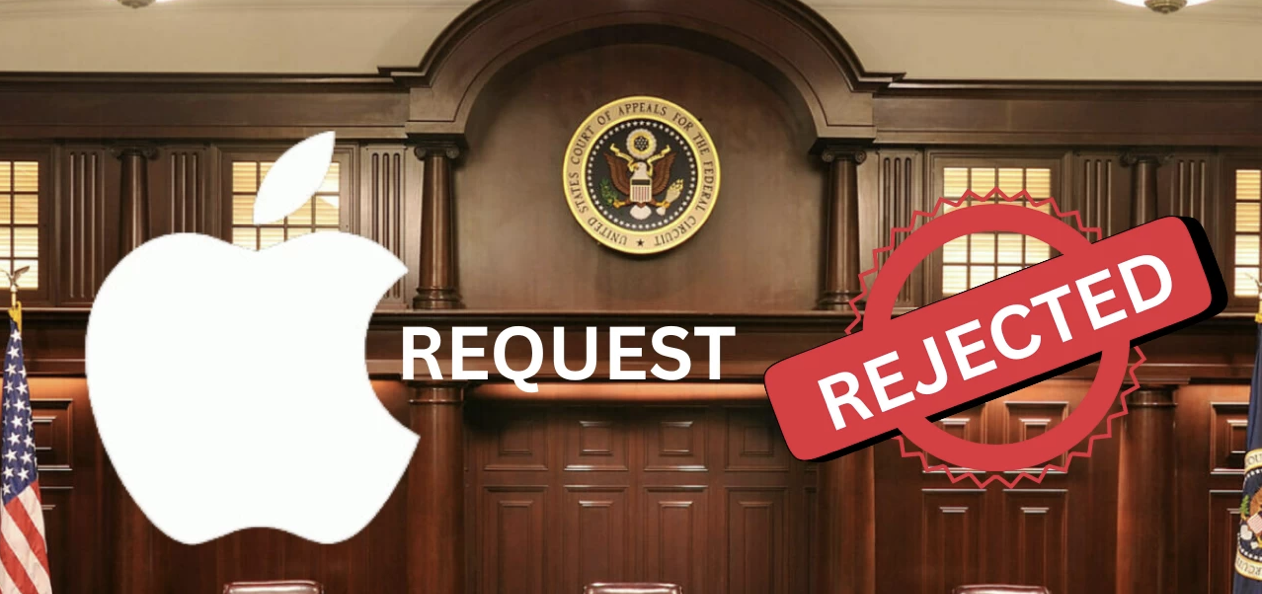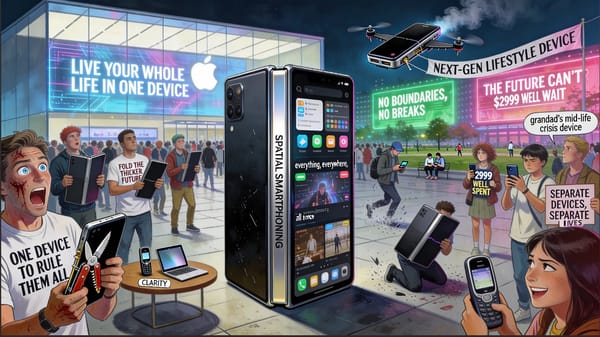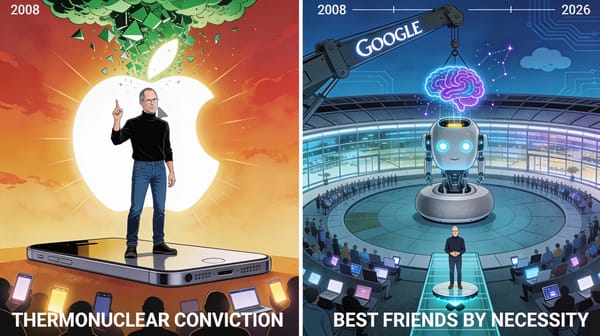Apple’s App Store Appeal Rejected: Ninth Circuit Nixes Dodging: Comply or “go to jail and pick up the soap.”
On the afternoon of 4th June 2025, Apple has lost its emergency motion to pause the enforcement of a court-ordered App Store reform. The Ninth Circuit has refused to shield Cupertino from a federal ruling that found it in contempt of court. Judgment Day looms.

.fyi note: this event is also featured on Apple 3.0

Judge Has Enough, Tells Apple to comply, implications are Tim Cook in the dock and Apple Legal on criminal charges?
Apple has just lost its emergency motion to pause the enforcement of a court-ordered App Store reform. The Ninth Circuit has refused to shield Cupertino from a federal ruling that found it in contempt of court, after years of foot-dragging and workaround policies that sought to preserve a lucrative, monopolistic revenue stream. The anti-steering rule is over. The attempted end-run is over. The “27% workaround fee” is over. And Apple’s credibility with the judiciary? Hanging by a thread.
Full Dispatch
As predicted by me in the face of nay sayers for an long term determined to presume Apple Exceptionalism would somehow survive the global onslaught of judges and regulators it has decided to cross swords with—and as Apple’s lawyers surely feared—the Ninth Circuit has rejected Apple’s bid to delay court-ordered reforms to the App Store. This comes in the wake of Judge Yvonne Gonzalez Rogers’ scathing April contempt ruling, which accused Apple not only of failing to comply with her injunction, but of actively designing policies to undermine it and her referring of the matter to the public prosecutor.
This is not just a procedural setback. It’s a reputational one, and a strategic unmasking.
For years, Apple insisted it was complying with the Epic Games ruling while quietly doing everything in its power to preserve the structural lock-in of iOS monetisation. The 27% “processing fee” Apple slapped on out-of-app payments was never anything but a fig leaf—an attempt to preserve the appearance of compliance while maintaining the economics of coercion.
Judge Gonzalez Rogers didn’t buy it. Neither did Epic. And now, on emergency appeal, the Ninth Circuit has gone “not you AGAIN?” . SCOTUS? Doesn’t care.
A Pattern of Evasion, Called Out in Court
Apple’s claim in its emergency appeal was that the ruling “blocks it from exercising control over core aspects of its business operations” and effectively forces it to give away infrastructure and services for free.
The court wasn’t moved. That framing—“we built the rails, we own the tollbooth”—is exactly what’s being dismantled. Not because Apple can’t run its store. But because it can’t run a store that traps developers into silence, penalises external choice, and calls it innovation.
Epic, for its part, pointed to a visible uptick in app market competition since the April contempt order. Developers are already providing alternate payments, better deals, and genuine consumer choice. In other words, the injunction is working—and Apple wanted to pause it precisely because of that. Who knows the truth in this, but it will come out in the statistics soon - I’m sure if it’s true, Epic will be the first to crow about it.
The Bigger Picture: This Isn’t Just About Epic
Let’s be clear: Apple’s position in this case is no longer defensible as “pro-user” or “pro-security.” That shield has worn thin. This is about billions in revenue, yes—but also about the risk of losing control over the gatekeeping layer that gives Apple de facto power over every monetised interaction inside its OS.
If that gatekeeping erodes—here, via court order; in Europe, via the DMA; potentially in future US legislation—the entire stack of Apple’s Services revenue starts to look exposed. Not broken. But no longer invulnerable.
And that’s the story. Not that Apple “lost a motion.” But that the long arc of antitrust pressure, developer frustration, and regulatory heat is starting to converge. Apple is used to fighting from behind when it suits them (see: Apple Silicon, privacy). But here, they’re not innovating their way out. They’re being forced out.
Conclusion: No More Dodges Left
The Ninth Circuit’s rejection means Apple has no more legal excuses. The injunction stands. The contempt ruling holds. And the gate, however reluctantly, must now be opened.
If Apple is smart, it will stop fighting the inevitable and build a better platform around trust, flexibility, and opt-in value—not coercive defaults and defensive accounting. It’s facing criminal charges at this rate if it doesn’t comply.
But based on their current posture, don’t hold your breath.
This isn’t the end of the App Store. It might be the start of a better one, at last, and maybe a chance for Apple to drop the hubris model and learn to “play well with others”.
But it might be the beginning of its transformation—not by design, but by force, and frankly after this public self -flagellating humiliation self-inflicted by a management determined to fight all regulators and judiciary all the time, everywhere, it would be about time for less hubris and a bit more of the vision thing returning.





